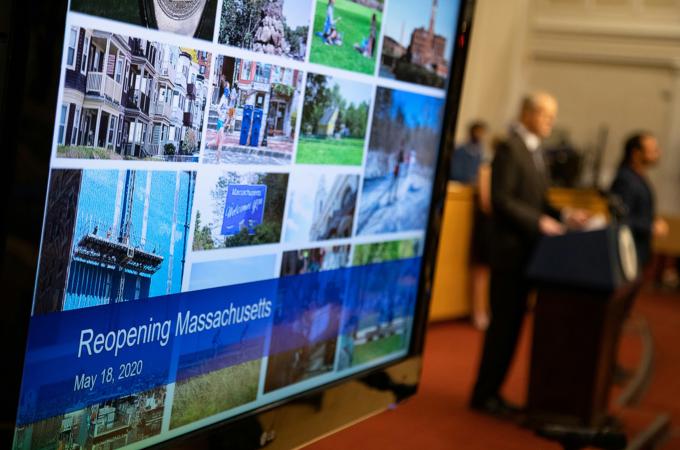Churches prepare to welcome back faithful for Masses
BRAINTREE -- Parishes may resume public Masses as early as May 23, according to new guidelines released by the archdiocese following the governor's announcement that houses of worship are included in the first phase of reopening in Massachusetts.
On May 18, Gov. Charlie Baker announced his plans for the first of four phases for reopening the Massachusetts economy. Each phase will last for at least three weeks, and the state may regress to a previous phase if there is a resurgence of COVID-19 cases. Phase 1, which began the same day, includes easing restrictions on houses of worship as well as such sectors as offices, manufacturing and construction.
According to the new standards issued by the state, the number of people present in a house of worship cannot exceed 40 percent of the building's permitted capacity or the number that can fit while observing social distancing requirements, whichever is smaller. Mass attendees who are not part of the same household must sit at least six feet apart. Seating should be blocked off to allow for sufficient distancing.
In keeping with the state's requirements, Mass attendees over the age of five must wear face coverings or masks. Parents may decide whether children between two and five years need to wear a mask. Children under two years should not wear masks. If someone cannot wear a mask due to a health reason, they will not need to provide documentation of it.
The state's standards include cleaning and disinfecting worship spaces between services, as well as ensuring that handwashing facilities are available. If a person who attended a service tests positive for COVID-19, the parish must conduct a deep cleaning and cooperate with the local board of health in their city or town as it traces likely contacts, who should be advised to self-quarantine.
During a previously scheduled webinar on May 19, the archdiocese provided additional guidance for reopening churches and parish offices. Over 1,500 people attended the webinar, which featured presentations from members of the archdiocese's reopening planning committee: chief healthcare ethicist MC Sullivan; executive director of risk management Joe McEnness; and Father Paul Soper, the archdiocese's secretary of evangelization and discipleship.
According to Sullivan, the news that houses of worship can reopen during Phase One came as a surprise, since the archdiocese had expected that they would reopen during a later phase.
As recently as May 14, Vicar General Bishop Peter Uglietto issued a letter to the archdiocesan community cautioning that it was "likely to be several more weeks before we can begin to implement our own phased-in plans to resume public Masses."
"This opening is meant to be a slow roll," Sullivan said, for two reasons. One is that such gatherings have not taken place for almost two months, and it will take time for parishes to arrange them and implement the new standards. The other is that "the virus hasn't gone away."
"We've managed to curb some numbers and send trends in the right directions, because of the mitigation that we've had, the fact that we've all stayed separate," she said.
However, she said, if there is a resurgence, they must be ready to shut things down again.
Father Soper explained that each parish must receive permission from its regional bishop or episcopal vicar to resume holding public Masses. This permission will only be granted if the parish has met all the state, municipal, and archdiocesan guidelines. These can be viewed on the archdiocese's Office of Risk Management webpage.
Upon receiving this permission, parishes can resume weekend Masses as early as May 23, though some parishes may prefer to wait until the following weekend in order to have more time to make the necessary preparations. Daily Masses, funeral Masses, and parish office operations can resume on May 25.
The emergency dispensation from attending Sunday Mass will remain in effect. The archdiocese is encouraging anyone particularly vulnerable due to age or health to remain at home. Parishes that have been streaming Masses are encouraged to continue doing so for people who are unable or choose not to attend in person.
Father Soper emphasized that "Parishes should not feel any obligation or pressure to start Masses before they're ready."
The archdiocese's guidelines will make the celebration of Mass look different in many ways. All hymnals and missalettes are to be removed, and holy water fonts are to be empty and, if possible, covered. There will be no processions, altar servers, holding hands for the Our Father, or exchanging the Sign of Peace. There will be no choirs or congregational singing, though a cantor is allowed. To observe limits on church occupancy, parishes can use registration software to have people sign up for services, or have volunteers count people entering the church. There also cannot be gatherings before or after Mass.
According to the archdiocese's guidelines, priests, deacons, lectors, and cantors do not need to wear masks while in the sanctuary, but they must observe social distancing. Any priest or other minister who has a respiratory infection should not participate in the celebration of Mass.
Instead of passing baskets to collect the offertory, the state and archdiocese encourage placing collection baskets near church entrances or having parishioners donate electronically.
The archdiocese's guidelines say that Eucharistic ministers must wear masks when distributing communion. There will be no distribution of the Precious Blood.
"Let's just say right up front, all of this is going to feel very strange, and it is," Sullivan said during the webinar.
But, "that's what's required," she added.



















